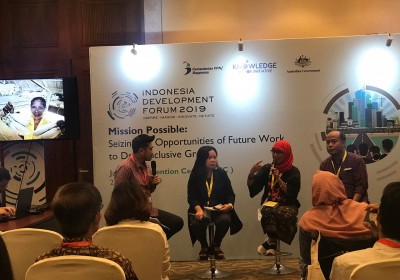IDF 2019: Identifying Barriers to Inclusive Employment Opportunities for Women
October 01, 2019
The MAMPU Panel Special Session (Australia-Indonesia Partnership for Women's Empowerment and Gender Equality) entitled "Decent Work for Women in the Informal Sector".
According to SAKERNAS data in August 2018, the participation rate of working men reached 83 percent, while the female participation rate was at 51 percent. Inequality of the number of women in the world of work compared to men's participation was one of the highlights in 2019 Indonesia Development Forum (IDF) with the theme "Mission Possible: Seizing the Opportunities of Future Work to Drive Inclusive Growth” on 22-23 July 2019 at the Jakarta Convention Center.
One obstacle for women in the world of work is the assumption that women do not need high careers. As stated by Kalis Mardi Asih from the Gusdurian Network at the Ideas and Innovation Marketplace session.
"We must build a more inclusive climate, to counter the thoughts that a Muslim woman should not leave the house and stop working," she said.
Kalis Mardi Asih believes that development is not only in the form of infrastructure, but also in the form of thought and mental development.
"Hijrah does not always mean having a long headscarf and then dropping out of work or activities, and what the da'wah account shares; that women only need to be glorified not equalized," she continued.
Meanwhile, Budi Wahyuni, Deputy Chairperson of the National Commission on Violence Against Women in the Imagine session of IDF entitled "Creating Inclusive Employment Opportunities", pointed out that employment sector is not yet inclusive. “In many companies in Indonesia, women experience gender inequality due to their status as women," said Budi.
Facing Vulnerability of Women's Employment Opportunities in the Informal Sector
IDF Special Session 2019 emphasized on the contribution of women to the work participation rate. The Innovate Special Session in collaboration with Mercy Corps Indonesia (MCI) also conveyed the idea of empowering women entitled "Women’s Economic Empowerment through Financial Inclusion".
One speaker was Tias Dewi Ratih, a housewife who had been earning an income by being an agent of Bank Mandiri. Tias worked diligently to proactively encourage people to save money. Her journey was not an easy one, because people do not immediately entrust their money to Bank Mandiri agents.
"I can restore people's trust to invest their money in Bank Mandiri through me as an official agent of Bank Mandiri," said Tias.
“We, the housewives, are very pleased to be provided with banking technology facilities. So, there is no need to bother making regular monthly payments," added Munirah, Agent of Bank Mandiri Bojonegoro.
Mercy Corps Indonesia has a role as the initiator of the service provider of financial institution agents, especially banks. MCI is targeting farmer groups and micro entrepreneurs who do not have much time or have difficulty reaching conventional bank outlets.
"MCI is trying to provide digital finance services education to rural bank agents, especially to women. Because women are considered to have greater influence, especially in gaining public trust," Andi Ikhwan, Director of Agriculture, Entrepreneurship and Financial Inclusion at MCI.
Another Special Session that discusses women and employment opportunities came through the MAMPU Panel Special Session (Australia-Indonesia Partnership for Women's Empowerment and Gender Equality) entitled "Decent Work for Women in the Informal Sector". Speaker Nani Zulminarni, Director of the Women's Head of the Family Foundation (PEKKA) told the stories of the women in the organization that she built who were the main breadwinner of their family. Most of them work in the informal sector.
"Generally the challenge is that of PEKKA women are invisible because of working in the informal sector, which makes them unrecognized as economic actors," Nani explained.
In fact, there is one trend that stands out from PEKKA members. Those who once used to produce products could no longer do it because of lack of raw materials. They become vendors.
"Then, they switched to services sector or entered the very vulnerable part of the labor sector. Or migrated to another country, which made them vulnerable to exploitation," continued Nani.
As migrant workers, women face new vulnerabilities.
"What is happening now, they suffer more because they are marginalized, especially those who work in the household sector," said Executive Director of Migrant CARE, Wahyu Susilo.
Other informal sectors which are also dominated by women are homeworkers. Still in a Special Session with MAMPU, the BITRA Program Coordinator, Erika Rosmawati, conveyed the efforts made to help homeworkers. But, this step faces many challenges because the law in Indonesia has not explicitly govern about homeworkers. BITRA encourages homeworkers to get Occupational Health and Safety (K3) protection.
"We collaborate with stakeholders so that homeworkers are also acknowledged by the government and the work can be protected. We are trying to propose ideas for a local regulation so that the government can protect homeworkers," said Erika.
The idea of women's equality in the world of work was also conveyed by Satya Budi Utama, Senior Unit Program Manager, CARE Indonesia. According to Satya, CARE focuses on addressing the underlying causes of poverty and social injustice for the lives of underprivileged communities and vulnerable groups, including women.
"Inclusive means that women must have a stake in self-actualisation in the world of work," Satya said in the Ideas and Innovation Marketplace session: Capturing and Sharing Knowledge in IDF 2019.
Indonesia’s Research Institutions Supporting the Development of the Electric Vehicle Industry
Indonesian Muslim Fashion and Cosmetics IKMs Shine at Dubai World Expo 2020
Govt Steps Up UMKM Transformation Efforts in the Midst of Pandemic Slowdown
Govt Encourages Promotion of IKM Products in Digital Era
Government Begins Developing Maritime Training Center in Makassar
Tweets by IDDevForum
